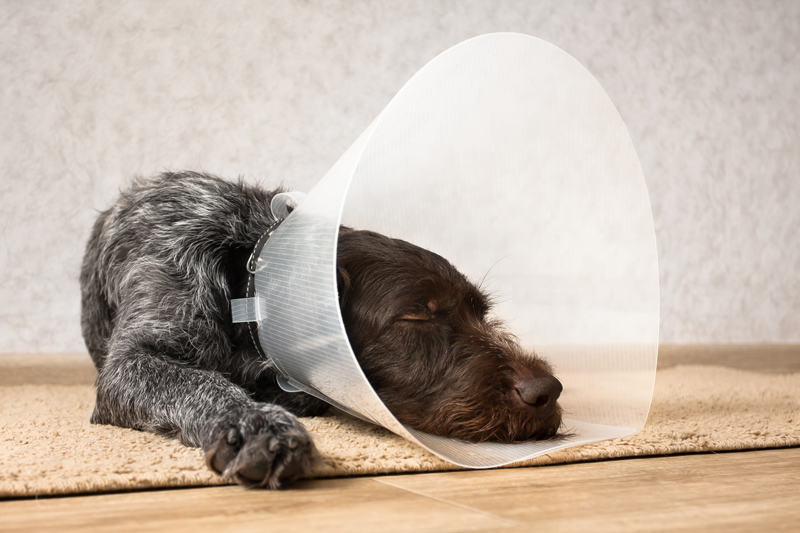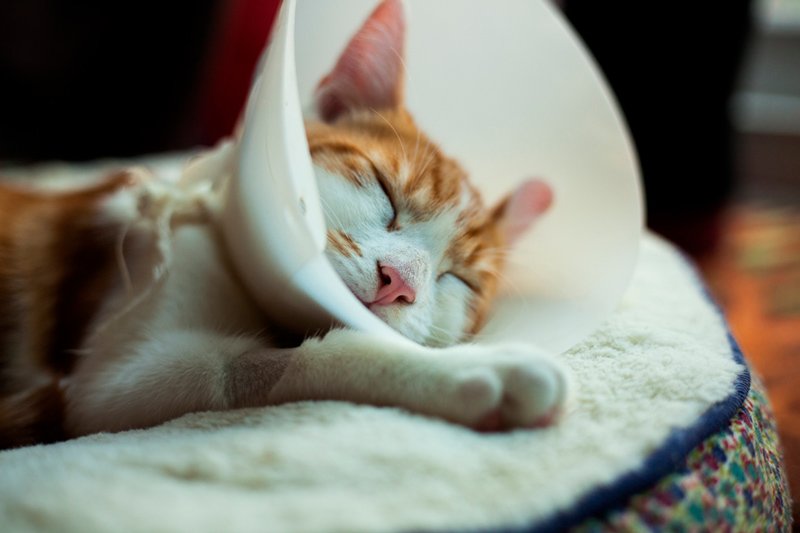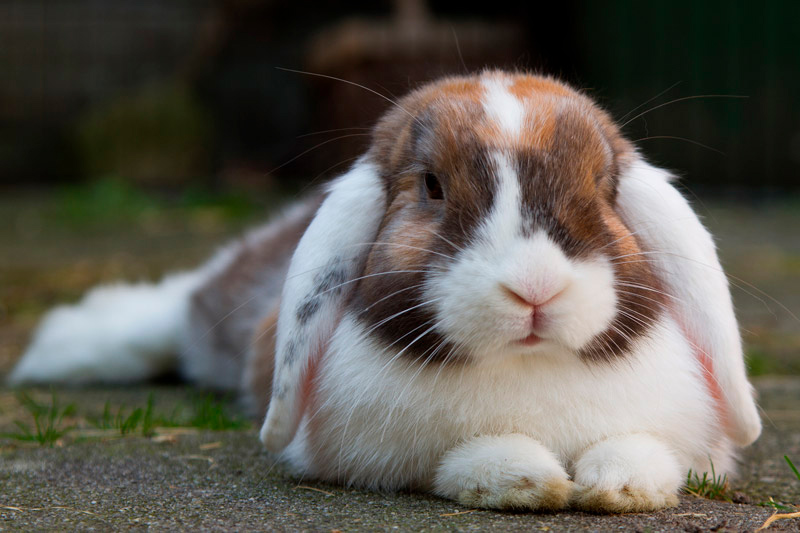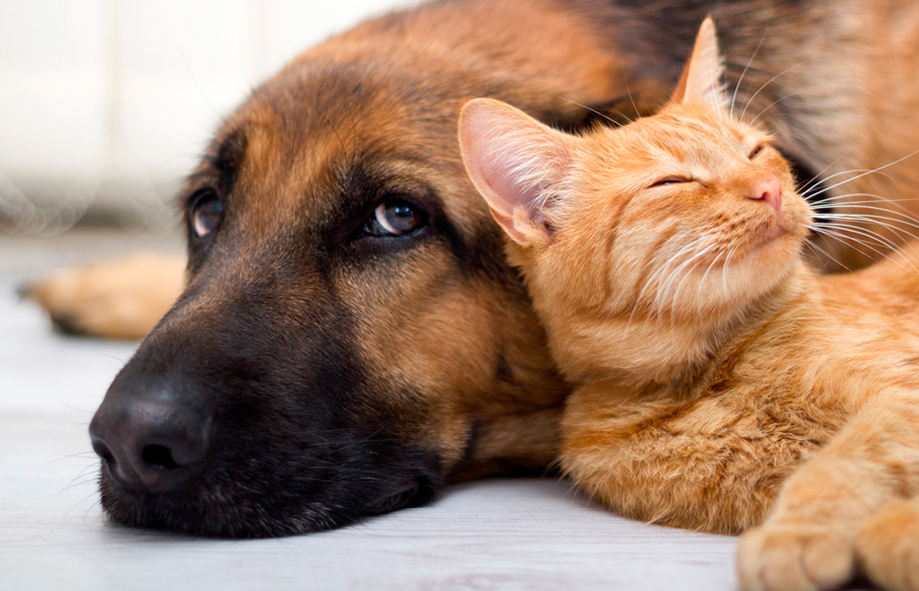
If you do not intend to breed from your dog, them we recommend having your dog neutered.
Not only does it prevent unwanted litters, but it also has many health factors that should be taken into consideration.
Spaying a female
Why should my bitch be spayed?
- Reduces the risk of mammary tumours (breast cancer)
- Prevents diseases being passed onto off-spring
- Reduces behavioral problems, such as straying or dominance.
- It prevents them from contracting life threatening uterine infections, more commonly know as pyometra. We frequently see this in older bitches. It can require risky emergency surgery.
- It prevents false pregnancy and uterine infections.
What happens when my bitch is spayed?
The spay operation involves the administration of a general anaesthetic and the surgical removal of the ovaries and uterus. The fur at the site of the incision will be shaved before surgery.
She will normally be admitted on the morning of her operation and will stay with us for the day. She will be able to return home later on the same day and advise that she is kept quiet.
The charge for neutering will also cover routine post operative examinations and pain killers, to ensure your little bundle is recovering back to full health.
When to spay
We can spay before the first season, at around 5 months old although in larger breeds it is recommended that they have at least one season before neutering so please contact us for advice. After a season we would normally recommend waiting 3 months before spaying.
Castrating a male
Why should my dog be castrated?
- Castration removes the risk of testicluar tumours
- Prevents unwanted litters
- Reduces the risk of prostate problems and some hormone related tumours.
- Castration can also alter behaviour problems, such as aggression and straying.
What happens when my dog is castrated?
The castration operation involves removing both testes under general anaesthetic through a small incision just in front of the scrotum. We usually use dissolvable stitches under the skin surface which do not require removal.
He will be admitted on the morning of his operation and will stay with us for the day. He will be able to return home later on the same day and advise that he is kept quiet.
The charge for neutering will also cover routine post operative examinations and pain killers, to ensure they are recovering back to full health.
When to castrate
Unless there is an urgent need, we normally wait until dogs have reached sexual maturity at six to seven months before neutering for behavioural reasons. Large breeds are normally neutered from 12 months old and giant breeds from 18 months to reduce the risk of joint problems.
Once your dog has been neutered there is a risk for him/her to become obese. We recommend feeding a ‘neutered dog’ diet designed to meet the different nutritional requirements of a neutered dog. One of our vets or nurses will be only to happy to give advice.
We will also invite your little one back for a FREE weight check with one of our nurses, approximately 10 weeks after being neutered, to ensure their weight hasn’t altered too much.
Neutering can sometimes affect your pet’s coat, especially in spaniels and red setters. If you wish to discuss this please contact us.
Non-permanent neutering by use of a hormone implant is also available. If you wish to discuss this please get in contact.

We strongly recommend getting your cat neutered if you do not intend to breed from them.
Cats can be neutered from 4 months old. If your kitten has just had a vaccination course we will generally wait 2-3 weeks after before neutering and generally prefer them to weigh over 2kg, although we can neuter earlier if you wish.
Spaying a female
We recommend having a female cat spayed before she reaches sexual maturity at 5 to 6 months of age and generally advises it at around 4 months. If your kitten has just had a vaccination course we will generally wait 2-3 weeks after neutering.
Once sexual maturity is reached, the cat will begin to come into season or ‘call’. Cycles of sexual activity typically occur every three weeks. Having your cat spayed will not only eliminate unplanned pregnancies but will also prevent diseases associated with the genital tract later in life.
The operation involves the administration of a general anaesthetic and the surgical removal of the ovaries and uterus through an incision made on the flank or belly of the cat. The fur at the site of the incision will have to be shaved.
She will be admitted in the morning of her operation and will normally be able to go home from late morning or early afternoon. We advise that she is kept quiet and most importantly kept inside. To find out more about the aftercare your cat might need, please contact us.
The charge for neutering will also cover their post-operative examinations and pain medication, to ensure your little bundle is recovering back to full health.
Castrating a male
Castrating a male is as equally important as spaying a female to prevent unwanted pregnancies. Additionally, entire male cats have a strong tendency to roam, to be aggressive to other males, to fight and to mark their territory by spraying urine (often indoors!). The aggressive behaviour puts an uncastrated male at much higher risk of serious infectious disease such as feline immunodeficiency virus (feline ‘AIDS’) and feline leukaemia virus, both of which are transmitted through cat bites.
Castration involves removing both testes under general anaesthetic through small incisions into the scrotum. Usually, the skin incisions for castration are so small that sutures are not required.
He will be admitted early in the morning of his operation and will be able to go home from late morning or early afternoon and we advise that he is kept quiet indoors. To find out more about the aftercare your cat might need, please contact us.
The charge for neutering will also cover their postoperative examinations, to ensure your little bundle is recovering back to full health.
What adverse effects might neutering have on my cat?
In the vast majority of cases, no adverse effects are noted following neutering. However, some neutered animals have a tendency to put on excess weight by storing surplus fat. Such pets require a balanced diet and should not be over-feed. We recommend feeding a ‘neutered cat’ diet designed to meet the different nutritional requirements of a neutered cat. One of our vets or nurses will be only too happy to give advice.
We will also invite your cat back for a FREE weight check with one of our nurses, approximately 10 weeks after being neutered, to ensure their weight hasn’t altered too much.

Rabbits
Rabbits should always live in bonded pairs and neutering is important to avoid fighting between same-sex pairs and unwanted litters in mixed-sex pairs.
In female rabbits, neutering is also important as uterine tumours are very common in older rabbits.
We would recommend that boded pairs always come to the surgery together whether one or both are being neutered to reduce stress.
We normally neuter rabbits from 4 months old. They are normally admitted on the morning of their operation and will be able to go home from early afternoon onwards.
Ferrets
Although we can neuter ferrets we recommend using a hormone implant instead as surgical neutering is associated with a high frequency of adrenal gland disease.
To get your dog, cat, rabbit or ferret neutered please feel free to call us on 01761 412132 or contact us via our online form


